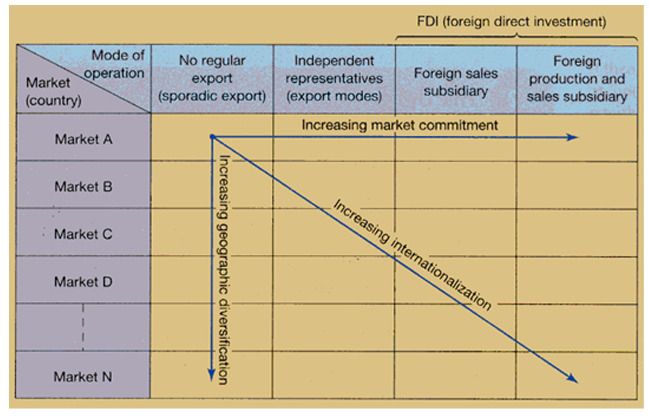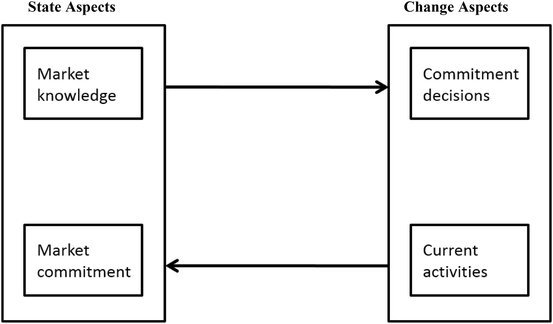Internationalization consists of standardized products or service through globally standardized marketing and production processes that target standardized customer needs. Internationalization can be described as the process of increasing involvement in international operations. Another definition denotes internationalization as the process of adapting firms’ operations (strategy, structure, resources, etc) to international environments. Both definitions emphasize the crucial fact that internationalization needs an overall support from the organisation as it is changing the environment to expand in various manners the process mostly consists of macro factors to evolve.
The Process of Internationalization
Internationalization fundamentally alters the price-setting strategies of domestic economic agents. This is true for agents operating in product markets, factor markets and financial markets. At a micro level, internationalization directly alters pricing behavior by deepening product and factor markets. More potential buyers and sellers imply greater competition and a reduction in excess returns. At a macro level, internationalization also has the potential to change the incentives faced by public policy makers.
From the above definition it can be derived that trade between two or more nation where there is potential buyers and sellers of good in which the pricing behaviors may alter from product and various factors involved in market which directly or indirectly benefits consumers. The factors involved in these process may vary from place to place but to enter new market knowledge is essential. It can be complex as policy and regulations change as per the market. It can make potential market for customers. There are various unions to promote international trade such as WTO (World Trade Organisation), EU (European union), ASEAN (Association of South-East Asian Nations), NAFTA (North American Free Trade Agreement), AFTA (ASEAN Free Trade Area), COMESA (Common Market for Eastern and Southern Africa) etc. They encourage the trade within the members union.
The Uppsala Internationalization Model
The Uppsala Internationalization Model was an outcome of Swedish researchers (Johanson and Wiedersheim-Paul, 1975; Johanson and Vahlne, 1977) which focused their interest on the internationalization process. Studying the internationalization of Swedish manufacturing firms, they developed a model of the firm’s choice of market and form of entry when going abroad.
The Uppsala model is one of the best known models of how firms set about the internationalization process. It presents a sequential approach, meaning that the firm internationalizes incrementally. The model assumes that there is a lack of knowledge of the foreign market which is detrimental to internationalization. Therefore it suggests that a firm should firstly establish itself in its domestic market, and then increase its commitment and resources in the target country in stages, progressing to the next stage once sufficient understanding and knowledge of the foreign market conditions have been attainted.
It is seen that companies begin their operations in abroad in fairly nearby market and gradually penetrated distant market. Companies should entry in new market with the export agents and sales subsidiaries. The approach specifies direct relation between market knowledge and market commitment is postulated, as knowledge can be gathered with effective use of human resources. Consequently, the better knowledge about a market can be derived, the more valuable are the resources and the stronger the market position of the firm. Uppsala approach requires general knowledge and market specific knowledge, where as market specific knowledge can be derived from practical experiences by entering the new market. However the approach stress on experimental learning as it cannot be acquired by objective knowledge (e.g., through marketing researches or reports) and must be gained mainly through direct experience. As the approach deals with experimental learning the human resource should be managed in proper manner.
It has distinguished between four different modes of entering an international market, where the successive stages represent higher degrees of international involvement market commitment. They as follow;
- Stage 1: No regular export activities (sporadic export).
- Stage 2: Export via independent representatives (export modes).
- Stage 3: Establishment of a foreign sales subsidiary.
- Stage 4: Foreign production manufacturing units.
These four stages deal with as no regular export activities in new market and knowing the market by experimental learning which helps in utilization of resources in effective ways. Exporting through independent agent can be suitable way of entering in new market as most of the firms prefer the way of entry.
Consequently, the threats and opportunities in a new market will be discovered primarily by those people who are working there. Experience generates business opportunities and constitutes a driving force in the internationalization process.
The Uppsala Internationalization Model is founded on four core concepts: Market knowledge, market commitment, commitment decisions and current activities. Market knowledge and market commitment at a certain point in time are assumed to affect the commitment decisions and how the activities are carried out in the subsequent period, which in its turn will influence market knowledge and market commitment at later stages. On the basis of these four concepts, and by making the assumption of instrumentalism, the model predicts that the basic pattern of firms’ internationalization is to start and continue to invest in just one or in a few neighboring countries, rather than to invest in several countries simultaneously and that the investments in a specific country are carried out cautiously, sequentially and concurrently with the learning of the firm’s people operating in that market. Firms are supposed to enter new markets with successively greater psychic distance and the market investments develop according to the so called establishment chain.
The Uppsala Internationalization Model deals with entering new market which is nearby or investing in single country rather than making a mess. It has leapfrogging tendency which allows entering in distant market. It shows companies can learn from their past experiences and practical knowledge. In these cases, competitive forces and factors override psychic distance as the principal explanatory factor for the firm’s process of internationalization. Furthermore, if knowledge of transactions can be transferred from one country to another, firms with extensive international experience are likely to perceive the psychic distance to a new country as shorter than firms with little international experience it can affect the smaller firms in case of psychic distances. The approach requires long term involvement in market to gain knowledge. The approach can be cost efficient to apply at initial stage but can take long time evolve the production barriers.
The Uppsala Internationalization Model underlies crucial importance people interest involved in the process. By sales subsidiaries it can be easy to find problems and opportunities in the market.
Advantages of Uppsala Approach
It deals with indirect exporting of product with help of external export agents or merchants. Low cost entry method which helps using capital in other factors quickest way of entering the new markets. Establishing foreign sales subsidiaries can help increase sales, potential customer base in market and creates market awareness about the product which identifies customer tastes and cultural factors which may change as per new market. By using foreign manufacturing unit labor cost and cost of production can be minimized.
Drawbacks of Uppsala Approach
Occasional exporting of goods can divert customers’ interest. Lack of knowledge in initial phase as the exporting is done by agents or exporting merchants. Inter-organizational learning in a business network implies that deep and long-lasting business relationships facilitate the assimilation of tacit knowledge from the different factors in the market. Human resources’ development programmes should be to gather knowledge about market. The Uppsala Internationalization Model implies that different groups at the operational level have a profound influence on the internationalization process. It is a relatively extreme “bottom-up” perspective, where the “bottom” plays the leading part and the headquarters play walk-on parts. It is not ease to apply for small firms in case of psychic distance.

